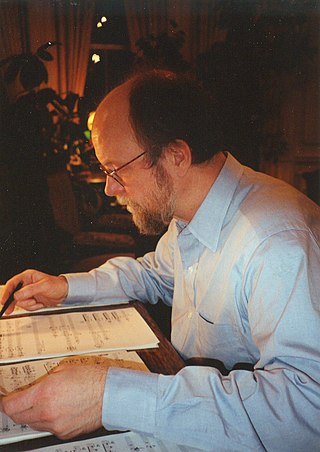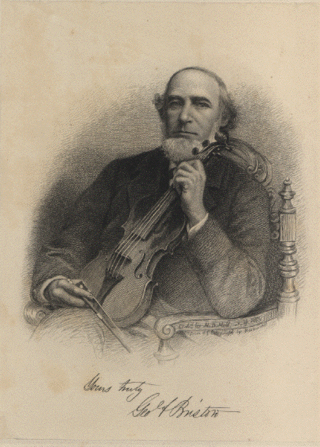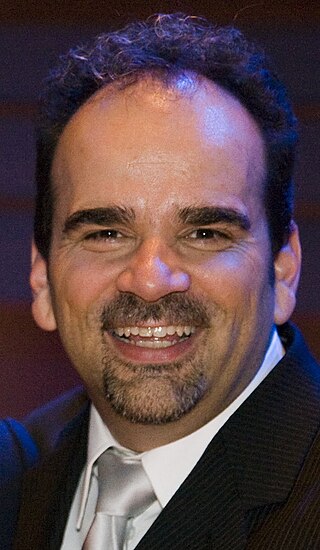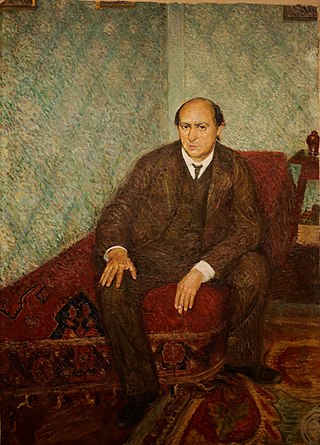Related Research Articles

Stuart Oliver Knussen was a British composer of contemporary classical music and conductor. Among the most influential British composers of his generation, his relatively few compositions are "rooted in 20th-century modernism, [but] beholden to no school but his own"

Charles Peter Wuorinen was an American composer of contemporary classical music based in New York City. He also performed as a pianist and conductor. Wuorinen composed more than 270 works: orchestral music, chamber music, solo instrumental and vocal works, and operas, such as Brokeback Mountain. His work was termed serialist but he came to disparage that idea as meaningless. Time's Encomium, his only purely electronic piece, received the Pulitzer Prize. Wuorinen taught at several institutions, including Columbia University, Rutgers University and the Manhattan School of Music.

Geirr Tveitt was a Norwegian composer and pianist. Tveitt was a central figure of the national movement in Norwegian cultural life during the 1930s.

Ferdinand Ries was a German composer. Ries was a friend, pupil and secretary of Ludwig van Beethoven. He composed eight symphonies, a violin concerto, nine piano concertos, three operas, and numerous other works, including 26 string quartets. In 1838 he published a collection of reminiscences of his teacher Beethoven, co-written with Beethoven's friend, Franz Wegeler. Ries' symphonies, some chamber works—most of them with piano—his violin concerto and his piano concertos have been recorded, exhibiting a style which, given his connection to Beethoven, lies between the Classical and early Romantic styles.

Wallingford Constantine Riegger was an American modernist composer and pianist, best known for his orchestral and modern dance music. He was born in Albany, Georgia, but spent most of his career in New York City, helping elevate the status of other American composers such as Charles Ives and Henry Cowell. Riegger is noted for being one of the first American composers to use a form of serialism and the twelve-tone technique.
Edward Gregson is an English composer of instrumental and choral music, particularly for brass and wind bands and ensembles, as well as music for the theatre, film, and television. He was also principal of the Royal Northern College of Music.

Kenneth Daniel Fuchs is a Grammy Award-winning American composer. He currently serves as Professor of Music Composition at the University of Connecticut in Storrs, Connecticut.

George Frederick Bristow was an American composer. He advocated American classical music rather than European pieces. He was involved in a related controversy involving William Henry Fry and the New York Philharmonic Society.

John Estacio is a contemporary Canadian composer of opera, orchestral and choral music.

Behzad Ranjbaran is a Persian composer, known for his virtuosic concertos and colorful orchestral music. Ranjbaran's music draws from his cultural roots, incorporating Persian musical modes and rhythms.
Peng-Peng Gong, formerly known as his stage name Peng Peng, is a Chinese classical composer and pianist born on July 3, 1992. Described by The Washington Post as an artist "with the confidence of a weathered veteran and a welcome unbridled quality to his playing", he has established himself as one of the most gifted young artists of his generation. At 18, he has become an internationally active concert pianist and a six-time American Society of Composers, Authors and Publishers National Award-winning composer in consecutive years since 2006. He was among the youngest pianists to be officially signed to the artist roster of the renowned Opus 3 Artists in 2007 at age 14, and the youngest composer to be signed by the [Lauren Keiser Music Publishing] in 2009 at age 16. Since 2005, he concertized and toured intensely in the North America, South America, Europe, and China, appearing in over a hundred solo and orchestral engagements. He was invited twice, on personal request, by House Speaker Nancy Pelosi to perform for the United States Congress.
Joseph Murray Banowetz was an American pianist, pedagogue, author, and editor, who taught at the University of North Texas. Banowetz was an expert on the music of the Russian romantic composer Anton Rubinstein.

Jack Gallagher is an American composer and college professor. His compositions include orchestral, chamber, piano and choral works. He has written two symphonies, which have both been recorded.

The Chamber Symphony No. 1 in E major, Op. 9 is a composition by Austrian composer Arnold Schoenberg.
Kenji Bunch is an American composer and violist. Bunch currently serves as the artistic director of Fear No Music and teaches at Portland State University, Reed College, and for the Portland Youth Philharmonic. He is also the director of MYSfits, the most advanced string ensemble of the Metropolitan Youth Symphony.

Andrey Rafailovich Kasparov is an Armenian-American pianist, composer, and professor, who holds both American and Russian citizenship.
The Third Essay for Orchestra, Op. 47, is a short orchestral work composed by Samuel Barber in 1978. The score is dedicated to Audrey Sheldon.

Elegia, Op. 4/1, is a composition for string orchestra by the Finnish composer Leevi Madetoja, who wrote the piece in 1909 during his student years. On 10 January 1910, Robert Kajanus, chief conductor of the Helsinki Orchestral Society, premiered the Elegia to great acclaim, with the piece described as the "first master work" of a budding "natural orchestral composer". Madetoja subsequently designated the Elegia as the first number in his four-movement Sinfoninen sarja, Op. 4, which the Helsinki Orchestral Society performed in its entirety under the composer's baton on 26 September 1910. The suite's three other numbers are virtually unknown, and the Elegia typically is performed as a stand-alone concert piece. Stylistically reminiscent of Tchaikovsky, it is, to date, Madetoja's most recorded and well-known orchestral composition, as well as the most enduringly popular of his many miniatures.
Jonathan Leshnoff is an American classical music composer and pedagogue.
Brinton Averil Smith is an American cellist.
References
- ↑ "James M Cohn". Echovita. Retrieved 11 August 2021.
- 1 2 3 Cohn, James (2008). "Autobiography and Description of Symphonies 2 and 7". Naxos Records. Retrieved 2008-05-15.
- ↑ http://www.sai-national.or/home/ComposersBureau/CohnJamesM/tabid/288/Default.aspx%5B%5D
- ↑ "Jamesarts". Archived from the original on 2018-01-02. Retrieved 2013-03-13.
- ↑ Hinson, Maurice (1993). Music for Piano and Orchestra: an Annotated Guide. Bloomington, Indiana: Indiana University Press. p. 68. ISBN 0-253-20835-1 . Retrieved 2008-05-15.
- ↑ James Cohn orchestral works